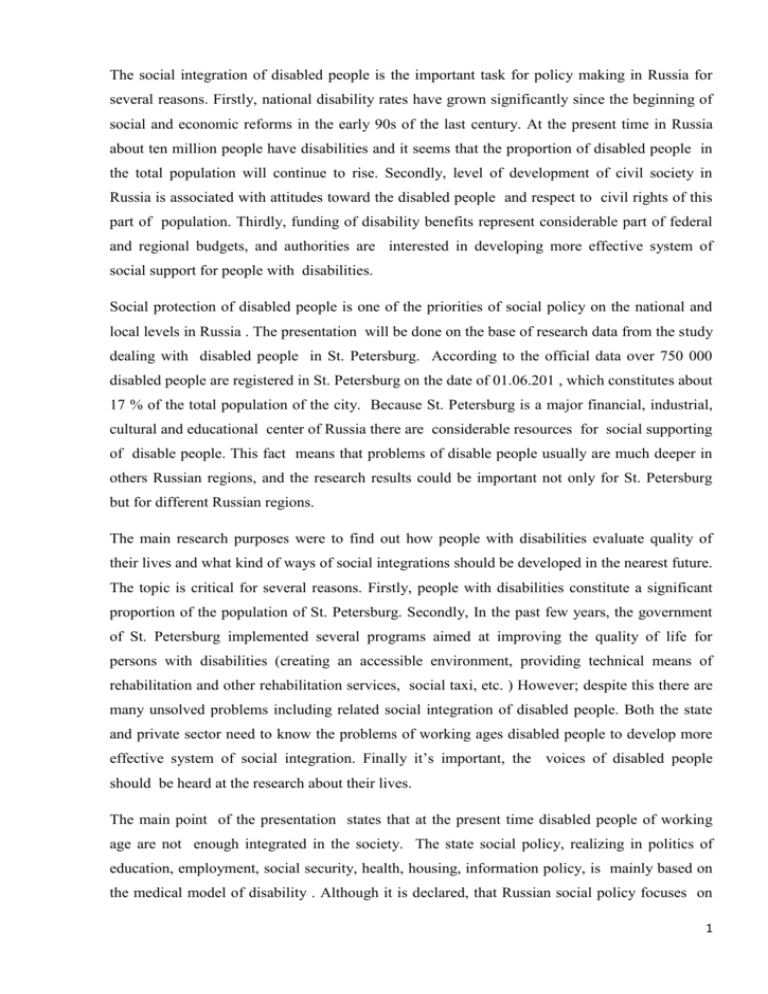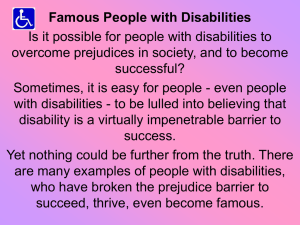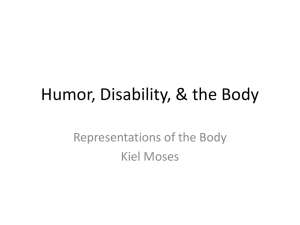The social integration of disabled people is the important task for
advertisement

The social integration of disabled people is the important task for policy making in Russia for several reasons. Firstly, national disability rates have grown significantly since the beginning of social and economic reforms in the early 90s of the last century. At the present time in Russia about ten million people have disabilities and it seems that the proportion of disabled people in the total population will continue to rise. Secondly, level of development of civil society in Russia is associated with attitudes toward the disabled people and respect to civil rights of this part of population. Thirdly, funding of disability benefits represent considerable part of federal and regional budgets, and authorities are interested in developing more effective system of social support for people with disabilities. Social protection of disabled people is one of the priorities of social policy on the national and local levels in Russia . The presentation will be done on the base of research data from the study dealing with disabled people in St. Petersburg. According to the official data over 750 000 disabled people are registered in St. Petersburg on the date of 01.06.201 , which constitutes about 17 % of the total population of the city. Because St. Petersburg is a major financial, industrial, cultural and educational center of Russia there are considerable resources for social supporting of disable people. This fact means that problems of disable people usually are much deeper in others Russian regions, and the research results could be important not only for St. Petersburg but for different Russian regions. The main research purposes were to find out how people with disabilities evaluate quality of their lives and what kind of ways of social integrations should be developed in the nearest future. The topic is critical for several reasons. Firstly, people with disabilities constitute a significant proportion of the population of St. Petersburg. Secondly, In the past few years, the government of St. Petersburg implemented several programs aimed at improving the quality of life for persons with disabilities (creating an accessible environment, providing technical means of rehabilitation and other rehabilitation services, social taxi, etc. ) However; despite this there are many unsolved problems including related social integration of disabled people. Both the state and private sector need to know the problems of working ages disabled people to develop more effective system of social integration. Finally it’s important, the voices of disabled people should be heard at the research about their lives. The main point of the presentation states that at the present time disabled people of working age are not enough integrated in the society. The state social policy, realizing in politics of education, employment, social security, health, housing, information policy, is mainly based on the medical model of disability . Although it is declared, that Russian social policy focuses on 1 the independence of persons with disabilities, in practice there are many barriers to this approach. There are a number of conflicts between disabled people, state, market and there is still no effective mechanisms for resolving the conflicts and in many case for enforcement of legislation against disability discrimination. In this context it is extremely important to take into account the point of view of people with the limited possibilities. These circumstances have determined the tasks and methods of the sociological research conducted in St.-Petersburg. The main research method was interviewing of people with disabilities, which was carried out on the basis of semi-structured questionnaire with a significant number of open questions. The research aims were to find out the most significant problems of three main groups of disabled people, namely people with disabilities of locomotor’s system, visually handicapped people and people with poor hearing. For the purposes to have more objective knowledge concerning research questions also 14 expert-interviews (with heads of non-governmental organizations, specialists on rehabilitation, specialists in social work, etc.) were conducted in the framework of the study. The main conclusion is that in Russia today there are serious obstacles to realization by disabled people their rights to education, work, welfare, that dramatically reduce the quality of life of citizens with disabilities and aggravates social inequality. However, the expectations on increasing the quality of life of disabled people connects predominantly with state and activities of local government. Russian system of social support of people with disabilities causes a lot of critics from the disabled people and experts. At the same time it is necessary to highlight significant positive shifts initiated by government to improve the quality of social services for people with disabilities and activization of non-governmental organizations working with disabled people, which play important role in advocacy of disabled people’s interests. Many activities of St. Petersburg’ government have been positively evaluated by disabled people, in particular improving transport service for disabled people, environment accessibility (rampant, lifts, etc.), developing system of rehabilitation services, many respondents noticed that now there is more attention to the disabled people from the state. In order to overcome existing shortcomings public authorities should follow in practice the social conception of disability and admit that disability is a reflection of social, technological and legal aspects of society. The analysis of the research results allows arguing, that the medical model of disability is still dominated in the sphere of social support in Russia. Now the main efforts of public authorities in the field of social integration of disabled people are directed to the creation accessible environment, i.e. the environment creating with taking into account of disable 2 people’s needs. But today the accessibility is estimated only from the technical infrastructure’s point of view. Social model of disability demands to evaluate accessibility by the criteria of quality of life, level of social integration, and observation of human rights. With the social model of disability, policy interventions aimed at increasing disabled people’s participation in social and economic life should not be made only at the individual level but also at the societal level. The significant changes in the field of social work are also needed. Social work besides the traditional social services should pay more attention to empowerment of disabled people and to develop the skills and capabilities of people with disabilities to live independent and manage own life. 3








